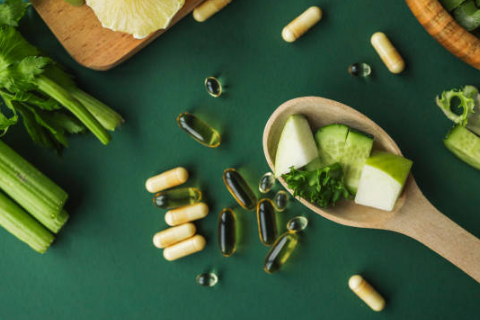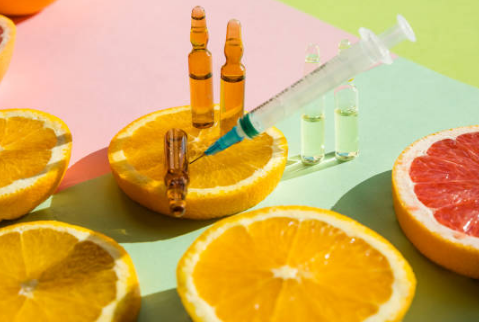Nutrition plays a crucial role in skin health. A balanced diet provides the essential vitamins and nutrients your skin needs to fight inflammation, recover from damage or illness, and slow down signs of aging. If your diet is lacking in skin-supportive nutrients, supplements may help enhance your skin’s appearance and health.
Good skincare habits like cleansing, protecting your skin from sun exposure, and managing stress also contribute to healthy skin. After all, your skin is the body’s largest organ—it protects against harmful bacteria, helps regulate body temperature, and produces cells that heal wounds. Keeping it healthy ensures it can perform these important functions well.
1. Vitamin C
Vitamin C is an antioxidant, which means it helps protect your body from free radicals—unstable molecules that can damage healthy cells. It’s found in many fruits and vegetables like bell peppers, oranges, kiwis, tomatoes, and broccoli.
Vitamin C is essential for skin health. It helps protect your skin from UV damage and plays a key role in collagen production—a protein that strengthens the skin.
The best way to use vitamin C for skin health is through topical serums or creams that contain it as a main ingredient. Topical vitamin C can promote wound healing, reduce inflammation, and help manage oily or acne-prone skin. Look for products with 10–20% vitamin C for noticeable results.

2. Vitamin D
Vitamin D is often called the “sunshine vitamin” because your skin produces it when exposed to sunlight. You can also get vitamin D from foods like meat, fish, cheese, eggs, and fortified products like cereals and milk. Some people may benefit from taking supplements.
Vitamin D supports the skin’s natural barrier, boosts immune response, promotes healthy hair growth cycles, and may protect against UV-related skin cancers. It may also help reduce inflammation.
-
Studies show that people with atopic dermatitis (a common form of eczema) often have low levels of vitamin D.
-
Supplementing with vitamin D may also help with psoriasis, although results are mixed.
-
One study found that high doses of vitamin D3 helped reduce sunburn symptoms.
There’s limited research on the effects of topical vitamin D, but small studies suggest it’s safe and absorbs well. Over-the-counter creams and ointments containing vitamin D (usually listed as calcipotriol) are often used to treat psoriasis and have shown positive results.
3. Vitamin E
Vitamin E is another antioxidant found in foods like spinach, nuts, vegetable oils, and whole grains. Research suggests it can help moisturize dry skin, support healthy hair growth, and reduce inflammation, especially in people with eczema or psoriasis.
You can get vitamin E through a healthy diet, supplements, or topical creams. However, it’s often more reliable when consumed internally, since topical vitamin E can degrade when exposed to light and air.
4. Vitamin A
Vitamin A may already be a part of your skincare routine without you knowing. Compounds called retinoids, derived from vitamin A, are widely used in both over-the-counter and prescription skincare products. These include retinol, tretinoin, adapalene, and tazarotene, as well as oral isotretinoin.
Retinoids are some of the most researched skincare ingredients. They help reduce wrinkles, treat acne, boost collagen production, even skin tone, and give skin a healthier, more youthful look.
You can also get vitamin A through your diet from leafy greens, sweet potatoes, and fortified foods like cereal and milk. Getting the recommended daily amount helps support healthy hair growth and protects your skin from UV damage.

5. Vitamin B3 (Niacinamide)
Niacinamide, a form of vitamin B3, is a common ingredient in many skincare products. It’s derived from niacin, another name for B3.
Vitamin B3 supports the outer layer of the skin by reducing inflammation, defending against UV damage, strengthening the skin’s natural barrier, and protecting against bacteria. Both topical and oral B3 can improve skin health from the inside out.
Foods rich in vitamin B3 include chicken, turkey, beef, fish, nuts, beans, brown rice, and fortified products.
Many OTC cleansers, moisturizers, and serums contain niacinamide, which can smooth skin texture, even out skin tone, and improve elasticity.
Other Ways to Improve Skin Health
While vitamins are important for skin health, they’re only one piece of the puzzle. Here are more ways to keep your skin looking its best:
-
Apply SPF 30+ sunscreen every time you go outside
-
Avoid smoking, as it speeds up skin aging and slows healing
-
Wash your face and body daily with warm water and a gentle cleanser
-
Manage stress, which can worsen acne, inflammation, and skin conditions
-
Get 8 hours of sleep each night—chronic sleep loss can disrupt hormones and increase inflammation
-
Stay hydrated by drinking plenty of water
-
Use hypoallergenic moisturizers to keep skin soft and supple
-
Wear sun-protective clothing and hats if sunscreen isn’t available
-
Limit time outdoors during peak sun hours (10 a.m. to 2 p.m.)

